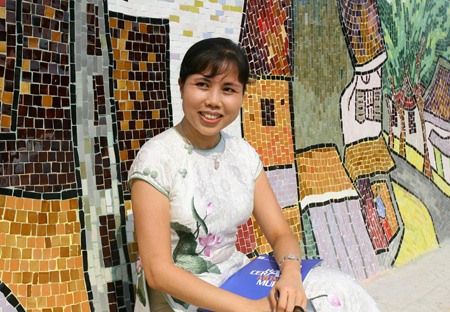 Life & Style
Life & Style

Artist Nguyễn Thu Thủy and her partners from New Hanoi Arts Group won a bronze at the 10th International Design Awards (IDA) in Los Angeles for a mural of Vietnamese trees and flowers at Đà Nẵng International Airport. Culture Vulture interviews her about awards and her interest in public arts.
 |
Artist Nguyễn Thu Thủy and her partners from New Hanoi Arts Group won a bronze at the 10th International Design Awards (IDA) in Los Angeles for a mural of Vietnamese trees and flowers at Đà Nẵng International Airport. Thủy also received an honourable mention for ‘Love Hanoi’, a heart-shaped mosaic sculpture by Trúc Bạch Lake in Hà Nội.
Thủy graduated from the Hà Nội Foreign Language Teacher Training University in 1992. She studied fine arts from 1992 to 2005 at artists Công Kim Hoa and Phạm Viết Công’s studios. She became a member of the Việt Nam Fine Arts Association in 2001.
She has made works for public art projects in Hà Nội, the provinces of Thái Nguyên and Thanh Hóa, and Trường Sa (Spratly Archipelago). Her ‘Ceramic Road’ project made a world record as the longest ceramic road.
She designed and completed the Việt Nam-France Friendship ceramic mosaic in Choisy le Roi city hall in France to mark the 40th anniversary of diplomatic relations between France and Việt Nam in 2013.
Culture Vulture interviews her about awards and her interest in public arts.
Are you happy to win the IDA awards?
Yes, I am very happy. After more than one month the jurors announced that the mural in Đà Nẵng airport won the bronze.
The jury decided to reward the best professional and emerging designers for their creativities, usability and innovation. The jurors include experts in design, editors-in-chief of the world’s leading design magazines and American and European chief editors of television channels on design.
My lotus-shaped fountain at Mai Xuân Thưởng Garden in Hà Nội also received an honourable mention at the 8th IDA in 2015.
Do you know why jurors chose the Đà Nẵng mural?
When I saw a panorama of Đà Nẵng’s new international airport I had an idea that to turn a concrete pillar into a Vietnamese tropical garden. The pillar is 7.4m in height and 6.4m in diameter and was painted with flowers which represent the tropical. One special thing is that we used a material from the French Guard Industry which is the protect guard colours to paint the mural.
This material is mostly used for building and industrial construction because of its water-repellent; oil-repellent and anti-soiling properties. Export manager of French Guard Industrie Daniel Bruyat was very surprised to see our mural painted with the protect colours. He asked me to send a proposal to Guinness World Records for the first and largest mural using the protect colours for a painting. We were very happy to send the new mural and new material to the IDA with new hope.
The judges praised the project’s creative and successful transformation of industrial construction into community art. The use of flowers and green trees helps create a fresh and environmentally-friendly feel for viewers, meeting criteria set for the IDA’s Design for Society and Design for Environment category.
You first studied at a foreign language college, not an arts school. How did you become an artist?
My father is a journalist who also writes plays. When I was small I followed him to theatres to watch rehearsals. I became fascinated with stage design and I pained copies of the posters for my father’s plays. But it was just a hobby. I painted in my free time and did not think it could become a career for me.
My passion for painting grew gradually, unbeknownst to me. After studying in Russia where I visited museums such as the Hermitage Museum I decided to study oil-painting and lacquer painting. I had group exhibitions with the Young Artists Club.
In 2007, I proposed the ‘Ceramic Road’ project along the Red River. It took my partners and I four years to complete the 4km-ceramic road which Guinness World Records recorgnised as the longest ceramic mural in 2010.
Why you are interested in public art projects?
After ‘Ceramic Road’ I continued my passion for developing art ideas and public arts as well including a 312-square-metre flag and six paintings at the airport centre and port bridge in Trường Sa and ceramic mosaic teapot fountain in the northern province of Thái Nguyên.
Public arts are my biggest passion. I want my creativity to be helpful for society. I try my best to beloved and recognised by Vietnamese and international people.
Last year, you were the only Vietnamese representative in the final round of the Julia Margaret Cameron Award for Women Photographers. What work of yours was chosen?
I was honoured to have six photos in the final round. Five of them were selected to be displayed at the Emotions: Commotions across Cultures exhibition in Berlin. Three of the photos were taken when I visited Trường Sa. I aim to introduce images of Trường Sa to exhibition goers in Europe to help them learn more about Vietnamese islands and seas. — VNS




